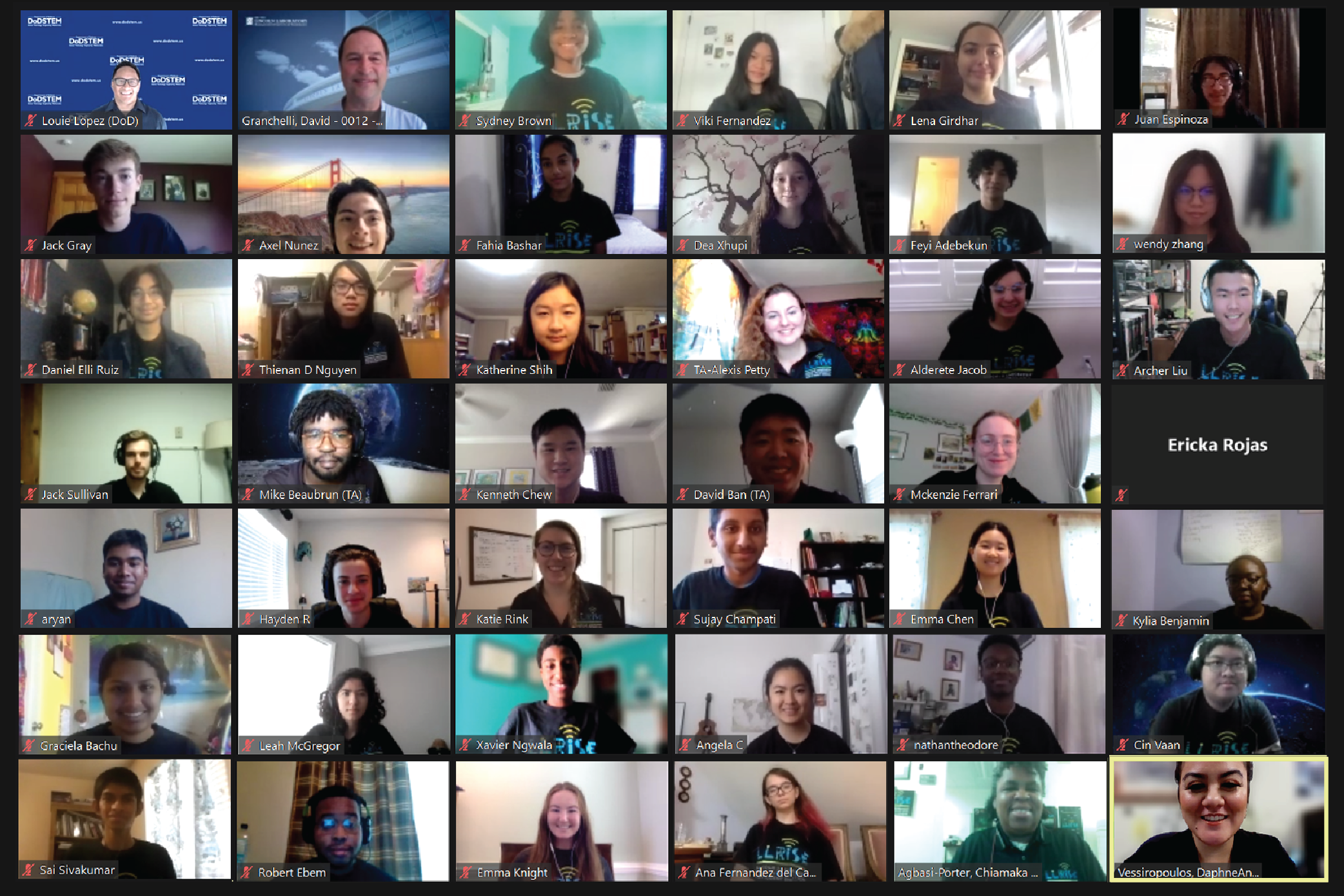Student-driven radar course rises to the challenge of online-only classes

The Lincoln Laboratory Radar Introduction for Student Engineers (LLRISE) summer course is a two-week radar workshop for rising high school seniors that was started in 2011 to bring accessible STEM learning to students from underrepresented communities. Typically, participating students stay in dormitories on MIT campus while attending the course on Laboratory grounds, but in 2020 and 2021 the course was offered in an online format due to the COVID-19 pandemic.
"Our biggest obstacle was definitely trying to translate a program that is so reliant on interpersonal interactions into a virtual environment in a meaningful way," says DaphneAnn Vessiropoulos, Communications and Community Outreach Office (CCOO), who helps organize the course each year. "We understood it would be difficult and different to implement, but LLRISE was always going to happen in our minds because it really is such an impactful program for everyone involved."
The primary demographic for the Laboratory’s educational outreach programs such as LLRISE is underserved and underrepresented communities in STEM, including women, people of color, low-income households, first-generation college students, and military dependents. When reviewing applicants and planning the course content, LLRISE organizers aim to create equity in the classroom for all students from different backgrounds. In order to make this happen virtually, they sent out a pre-course survey to see what resources students might need — such as WiFi and a laptop — so that they could work with students and their communities to obtain the equipment needed to excel in the course.
The course is taught by both Lincoln Laboratory staff and college students who assist as tutors and for additional instruction. Typically, the course guides the students through the intricacies of how to build a small radar. However, to limit the complexity of debugging the radars and for the safety of the students, for the online classes they were sent a simpler radar that had been preassembled by staff at Lincoln Laboratory.
During the course, students conducted hands-on experiments that demonstrated radar fundamentals. For example, one of the exercises in the 2020 class required the students to create a small pendulum from an object and string. They let the pendulum swing in front of the radar and created Doppler spectrograms to trace out the speed of the pendulum, and then altered variables such as the length of the string and the height of the pendulum drop to see how the spectrogram changed.
At the end of the program, students presented their final group projects to Laboratory personnel as well as families, friends, and peers to demonstrate what they had learned and to showcase their talents. For many of their experiments, students used their radar to measure the distance and speed of objects, and they also used the radar to create a 2D image of a 3D environment. One group of students in the 2021 class measured the movement of a ball as it went down a staircase, and another measured how fast a dog’s tail wagged as different people it knew came home.
To facilitate the program online, the LLRISE committee used Zoom for livestream lectures and office hours, the Laboratory’s external edX instructional platform for lectures and supplemental material, and Discord to enhance the social aspect of the program between students, the instructors, and teaching assistants.
Though there were occasional technical difficulties, the course organizers saw benefits that resulted from the virtual format, says Chiamaka Agbasi-Porter, CCOO. For example, during the live lectures, students freely typed questions in the chat window, which served as an open forum. Often, other students would answer the questions for each other. Students also seemed more at ease while presenting online — they spoke clearly and appeared less stressed than when presenting in person.
In 2021, the students and teaching assistants held a game night through Discord where they played the video game Among Us, which one group of students then used as the theme for their final presentation.
After the workshops, the students had positive feedback. Jade Kramer from Air Academy High School in Colorado Springs, and who participated in the 2020 cohort, describes it as "unique and diverse in subject, yet convivial in environment. This experience was both extremely thought-provoking and fun."
Katie Rink, a college student from the University of Massachusetts, Dartmouth, who was a teaching assistant in 2021 says, "LLRISE is more than just an educational program, it’s an opportunity to meet likeminded people and geek out about your nerdiest passions! All while learning from world experts and gaining invaluable career advice."
The 2020 LLRISE program included 35 students from 19 states across the country, and the 2021 program hosted 31 students from 15 states. This year was also the first where a condensed version of the program, called LLRISE Spring Break, was done in collaboration with a group called the Texas Alliance for Minorities in Engineering (TAME). Twenty-five students and two teachers participated in the program this year.
Even after the LLRISE course concluded, students continue to benefit from the experience and the friendships they gained through it. "Our students from 2021 are still messaging each other on the Discord server to talk about college admissions and other high school experiences with each other," says Vessiropoulos. "If LLRISE went on a hiatus, all these students would miss out on these wonderful friendships and opportunities, which is why hosting the program, even if it was virtual, was so imperative."